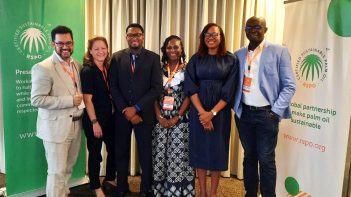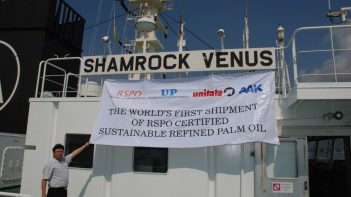Kuala Lumpur, 29 December 2020: Child labour is a troubling and often hidden issue that sadly persists in low-income agricultural settings, including in the palm oil sector. This is especially true in less affluent countries where a lack of facilities such as access to schooling, crèches and/or after school care systems are not yet in place. This is why independently audited certification schemes are so vital in these settings.
The RSPO has banned the use of child labour since its founding and our standards are clear on the protection of child rights. We now certify nearly 20% of the world’s palm oil, 79% of which is grown in the tropical climates of Indonesia and Malaysia, but we still have a long way to go. Child labour is not something the RSPO can tackle alone. The role of governments and the enforcement of rules and regulations in producer nations continue to play a critical role alongside voluntary certification in solving this complex challenge.
Since 2018, RSPO members have been required to produce photographic identification and additional evidence to verify the age of all workers. Our 4,900 members have committed to a standard that is unsurpassed by any other agricultural scheme and, while we still have work to do, we take inspiration from the progress made by our members in the last decade.
An open and transparent discussion of these issues, as highlighted by the recent Associated Press articles, will help bring more attention to the uncertified crop and allow us to encourage more growers to adopt our standards. But it’s not just about growers and producers in Malaysia and Indonesia. We know that everyone in the global supply chain has a role to play, including consumers. At RSPO, we call this Shared Responsibility. Currently, the supply of certified sustainable palm oil is outstripping demand. Some of our downstream members, including some of the largest major consumer brands are already purchasing 100% certified sustainable palm oil in physical form, but we need more companies outside of the RSPO to commit to this goal.
In the meantime, we will continue to act swiftly and decisively to address any violations of our standards by investigating all complaints in accordance with our rigorous procedures. The authors of this AP article did not refer to violations specifically in RSPO certified plantations, but we know our current systems are not perfect. We must continue to rely on the support of partners to help us identify and address any gaps in enforcement, and to further strengthen and improve our coverage of assurance and oversight of labour standards – be it through our formal grievance process or other mechanisms. We firmly believe that the RSPO, with our inclusive multi-stakeholder and consensus-driven process, is the best way to hold all members to account and to encourage more companies to go beyond what is required by law and commit to global standards that are informed and demanded by society.
We call on all members, stakeholders, civil society and governments to build on the voluntary initiatives from the private sector by implementing and enforcing labour laws to ensure all companies, wherever they operate, follow consistent standards to act responsibly and address both social and environmental issues that are negatively impacting the sector.
Furthermore, we reiterate that any organisation or agency that has additional information about allegations or any violations of this nature found on RSPO member plantations, to submit a complaint through our Complaints System or use our Human Rights Defender Hotline.
About RSPO:
The Roundtable on Sustainable Palm Oil (RSPO) was formed in 2004 with the objective of promoting the growth and use of sustainable oil palm products through credible global standards and engagement of stakeholders. RSPO is a not-for-profit, international, membership organisation that unites stakeholders from the different sectors of the palm oil industry including oil palm producers, palm oil processors or traders, consumer goods manufacturers, retailers, banks and investors, environmental or nature conservation NGOs, and social or developmental NGOs.
This multi-stakeholder representation is mirrored in the governance structure of RSPO such that seats in the Board of Governors, Steering Committees and Working Groups are fairly allocated to each sector. In this way, RSPO lives out the philosophy of the "roundtable" by giving equal rights to each stakeholder group, facilitating traditionally adversarial stakeholders in working together to reach decisions by consensus, and achieving RSPO’s shared vision of making sustainable palm oil the norm.
The seat of the association is in Zurich, Switzerland, while the secretariat is currently based in Kuala Lumpur with satellite offices in Jakarta (ID), London (UK), Zoetermeer (NL), Beijing (CN) and Bogotá (CO).
For further information, kindly contact:
|
Name: Dan Strechay Position: Global Outreach & Engagement Director Email: [email protected] |
Name: Fay Richards Position: Global Communications Manager – EMEA Email: [email protected] |
Keep reading

RSPO hosts first Africa downstream sustainable palm oil supply chain forum in Cape Town

Nearly two decades on, Europe continues to drive global demand for RSPO Certified Palm Oil

Communicating Sustainable Palm Oil - examples of success across Europe
[EOT] Terms of Reference: Independent Smallholders Outreach Programme in Indonesia

RT2023 Delegates Propose Solutions to Reinforce RSPO’s Assurance System – End-Year Highlights of Assurance Standing Committee
RSPO UK Members' Day Examines Shifting Dynamics of Doing Business within Europe

Celebrating 20 Years of RSPO’s Sustainability Journey




